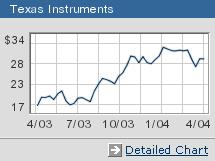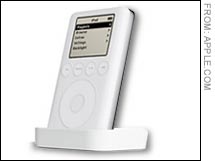
NEW YORK (CNN/Money) -
The first week of the tech earnings flood is coming to a close. So what have we learned so far?
Apparently, the fourth quarter holiday cheer has flowed into the first quarter.
The tech companies that have reported the most significant positive earnings or sales surprises and had the most positive outlooks are the ones that have significant exposure to the supernova-hot consumer electronics market.
Texas Instruments (TXN: Research, Estimates) came in with first quarter sales Wednesday that were ahead of raised expectations and gave a solid second quarter sales outlook thanks to strong sales of chips for cell phones and flat-screen TVs.

| |
|
Strong sales of chips for cell phones and other consumer gadgets have helped lift TI's stock.
|
|
Apple (AAPL: Research, Estimates) shipped more iPods in its fiscal second quarter than Macintosh computers. Advanced Micro Devices (AMD: Research, Estimates) posted a better than expected first quarter profit, in large part due to strength in its flash memory chip business. Flash memory chips are key components of cell phones and other wireless devices. (For a look at more chip companies that cater to the consumer electronics market, click here.)
Meanwhile, Intel (INTC: Research, Estimates), which generates most of its sales from microprocessors used in personal computers and servers, reported first quarter sales Tuesday that were below expectations and gave unexciting sales guidance for the second quarter. (Intel also has a flash memory business but the division it is a part of accounts for just 13 percent of total sales.)
To be sure, big businesses do appear to be increasing their tech spending (Intel, after all did report a 20 percent gain in sales from a year ago). And investors heard more confirmation of this when IBM reported its first quarter earnings after the bell Thursday.
But it's the consumer that is still king. Chief technology officers of Fortune 500 companies aren't rushing out to buy lots of new cell phones, MP3 players and digital cameras for their employees...but their kids are another story.
Teens want their MP3s!
In fact, one economist says favorable demographics have played a major role in fueling consumer electronics spending and that this trend could continue for the next few years.
 |
|
| Listen to the music! Apple sold more iPods than Macs in its latest quarter. |
"The baby boom echo generation is now in their mid-teens, at a time when demand for electronics is very high. And they're old enough now to put pressure on their parents to ante up. I know that from personal experience," said Mark Zandi, chief economist with Economy.com, who said he's already bought two iPods for his kids.
And Zandi adds that the ever-resilient consumer should have no problem spending more on consumer gadgets as long as the economy continues to improve.
Keep in mind that consumer electronics sales have held up despite all the talk of a jobless recovery. If the employment picture does actually brighten as the year goes on, Zandi sees no reason for a big pullback in spending, particularly among the more affluent consumers.
Another encouraging sign for companies with electronics exposure is that prices for many of the more popular gadgets are starting to come down, which should provoke much broader adoption of these products.
| Recently in Tech Biz
|

|
|
|
|
"In some instances, companies are still just skimming the cream off of the early adopters and migrating into the masses," said Stephen Baker, a consumer analyst with market research firm NPD Group.
Baker said this trend would probably play out most noticeably in the flat-panel TV market and with new recording technology, such as DVD recorders and digital video recorders (think of stuff like TiVo...even if it's not necessarily a TiVo).
Price wars a concern...so stick to suppliers
Of course, falling prices are great for consumers but not always for investors. For example, SanDisk (SNDK: Research, Estimates), a leading manufacturer of memory cards for digital products, reported stronger than expected profits and sales Wednesday but shares plunged more than 11 percent Thursday on concerns about pricing pressures and the effect they would have on margins.
The company indicated during its conference call that it was keeping prices low on higher-end 256 megabyte and 512 megabyte cards in order to drive sales.
Although the market seemed to overreact a bit, SanDisk does illustrate the risk of investing in companies that sell many of their products directly to retailers as opposed to supplying components to manufacturers of the gadgets. More than 60 percent of SanDisk's sales came from direct retail sales...you can even buy some SanDisk memory cards in a convenience store or supermarket.
That's why the best bet for investors hoping to take advantage of strong consumer electronics demand would probably be to stick with chip firms like Texas Instruments and others with healthy consumer exposure such as Linear Technology (LLTC: Research, Estimates), which also reported better than expected results Tuesday.
That way, you're not gambling on who will win the war on the store shelves but investing in the companies that should benefit as long as overall consumer electronics sales remain robust.
Sign up to receive the Tech Investor column by e-mail.
Plus, see more tech commentary and get the latest tech news.

|

